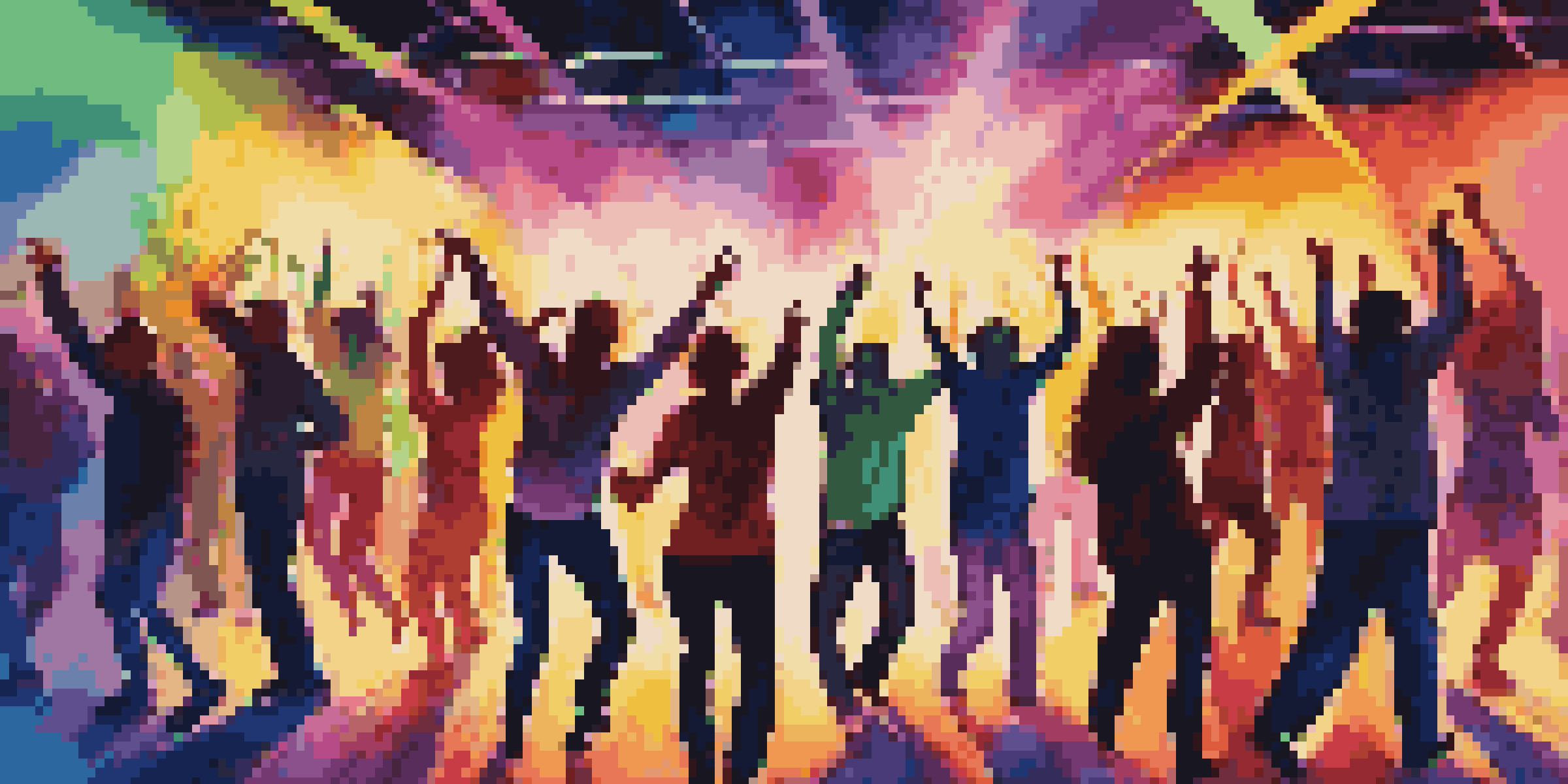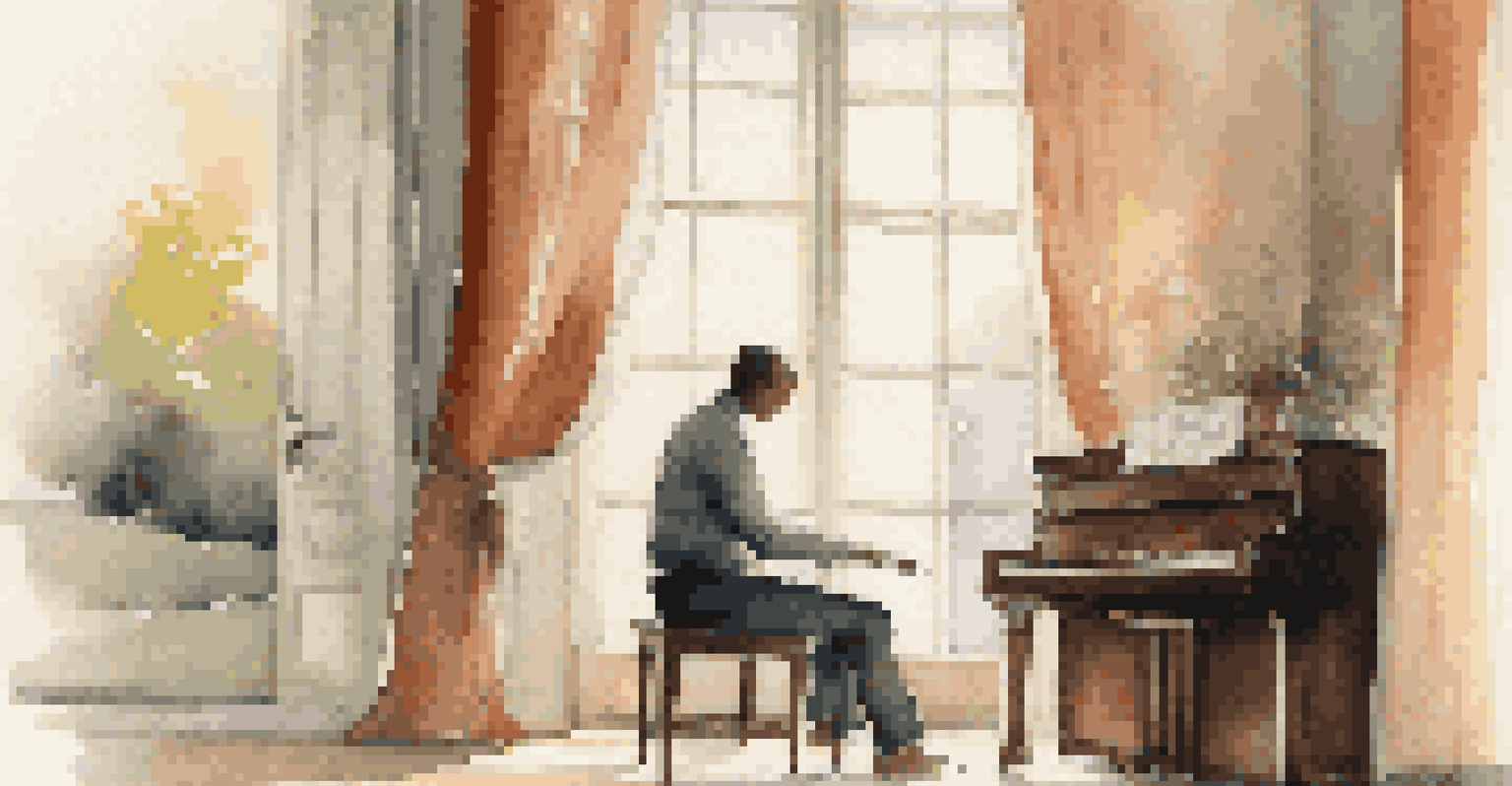The Relationship Between Music Genres and Temporal Experience

Understanding Temporal Experience in Music
Temporal experience refers to how we perceive time, which can vary greatly depending on context. In music, this perception is often influenced by tempo, rhythm, and genre. For instance, a fast-paced song can make time feel like it's flying by, while a slow ballad might stretch those minutes into what feels like hours.
Music is the shorthand of emotion.
This relationship is more than just anecdotal; research shows that our brain processes music in ways that can alter our sense of time. The beats we hear can trigger emotional responses that push our perception in one direction or another. This interplay of emotion and tempo creates a unique experience for each listener.
Thus, understanding how different genres manipulate our temporal experience can enhance our appreciation of music. By recognizing how a song can change our perception of time, we can become more mindful listeners, enjoying not just the music, but also the moments it creates.
The Role of Tempo in Temporal Perception
Tempo is perhaps the most straightforward element affecting our sense of time in music. Generally, a faster tempo tends to make time feel shorter, while a slower tempo can extend our experience. Think about how you might feel at a lively dance party versus a calm evening listening to a slow song—each environment is marked by a different temporal sensation.

This phenomenon is not just theoretical; it's been observed in various studies. For example, participants listening to fast-paced music often report feeling as if less time has passed compared to those listening to slower music. This shows how tempo serves as a powerful tool in shaping our perception.
Tempo Shapes Our Perception of Time
The tempo of a song significantly influences how we perceive time, with faster tempos making time feel shorter and slower tempos stretching our experience.
So, next time you're enjoying your favorite tracks, pay attention to the tempo. It’s fascinating how something as simple as a beat can shift your entire experience of time, making you feel energized or relaxed depending on the song.
Genres with Fast Tempos and Their Effects
Genres like electronic dance music (EDM) or punk rock are notorious for their fast tempos. These styles are often designed to get people moving, creating an exhilarating atmosphere that makes time seem to fly. When you're lost in the rhythm of a high-energy track, it’s easy to lose track of time altogether.
Time flies when you're having fun.
Listeners frequently report a state of 'flow' when engaging with fast-paced music. This psychological state is characterized by complete immersion and enjoyment, further enhancing the feeling that time has slipped away. It’s as if the music has a magical ability to transport us beyond the confines of the clock.
Moreover, these genres often incorporate repetitive beats, encouraging listeners to dance or engage in other activities. This engagement amplifies the sensation of time speeding up, as our focus shifts entirely to the music and the moment.
Genres with Slow Tempos and Their Effects
In contrast, genres like classical, jazz ballads, or ambient music often feature slower tempos. These styles create a reflective atmosphere that can cause listeners to feel as if time is stretching out. When you listen to a slow piece, each note lingers, often prompting deeper thought and introspection.
This slowing down of time can create an emotional connection, allowing listeners to fully immerse themselves in their feelings. For instance, many people find solace in a slow piano piece during times of stress or sadness, as it mirrors their emotional state and provides a comforting backdrop.
Genres Impact Temporal Experience
Different music genres, like fast-paced EDM or slow classical pieces, create distinct temporal sensations that affect our emotional responses and memory.
Additionally, this extended temporal experience can also lead to a sense of nostalgia. The slower tempos often evoke memories or feelings from the past, enriching our experience and reminding us of moments that matter.
Cultural Influences on Temporal Experience
Cultural background plays a significant role in how we experience different music genres and their respective tempos. For example, some cultures may favor rhythmic patterns that are faster or slower, impacting how music is perceived within those communities. This cultural lens shapes our emotional responses and, consequently, our temporal experiences.
Moreover, different genres often emerge from specific cultural contexts, further influencing how time is experienced. For instance, traditional folk music may have a different pacing and feeling compared to contemporary pop music, reflecting the values and lifestyles of the cultures they originate from.
By exploring music through a cultural lens, we can appreciate the diversity of temporal experiences across the globe. Understanding these differences enriches our overall appreciation for music and its powerful influence on our perception of time.
Personal Experiences with Music and Time
Our individual experiences with music can profoundly shape our perception of time. Think about moments in your life when a specific song took you back to a particular memory or feeling. That connection often distorts our understanding of how much time has passed, making us feel as if those moments were both fleeting and eternal.
For many, music serves as a soundtrack to life’s most significant events—birthdays, weddings, or even quiet nights alone. Each song can evoke powerful emotions and memories that make time feel different based on the context in which we listen. It’s this personal connection that enhances our understanding of temporal experience.
Cultural Context Influences Music
Cultural backgrounds shape how we perceive music and its tempo, affecting our emotional connections and overall experience of time.
Reflecting on your relationship with music can lead to insightful realizations about how it shapes your experience of time. Consider keeping a playlist of songs that resonate with you and observing how they make you feel in different moments.
The Future of Music and Temporal Experience
As technology continues to evolve, so too will the ways we experience music and time. With advancements in sound engineering and virtual reality, the ability to create immersive musical experiences could lead to even more profound shifts in our perception of time. Imagine being enveloped in a soundscape that alters your understanding of time in real-time.
Moreover, the rise of personalized music playlists and AI-generated songs could create tailored experiences that resonate with individual listeners. This customization may allow for deeper emotional connections, creating a unique temporal experience for each user.

As we embrace these changes, it’s essential to remain mindful of how music influences our perception of time. By understanding this relationship, we can navigate our evolving musical landscape while cherishing the timeless experiences that music provides.